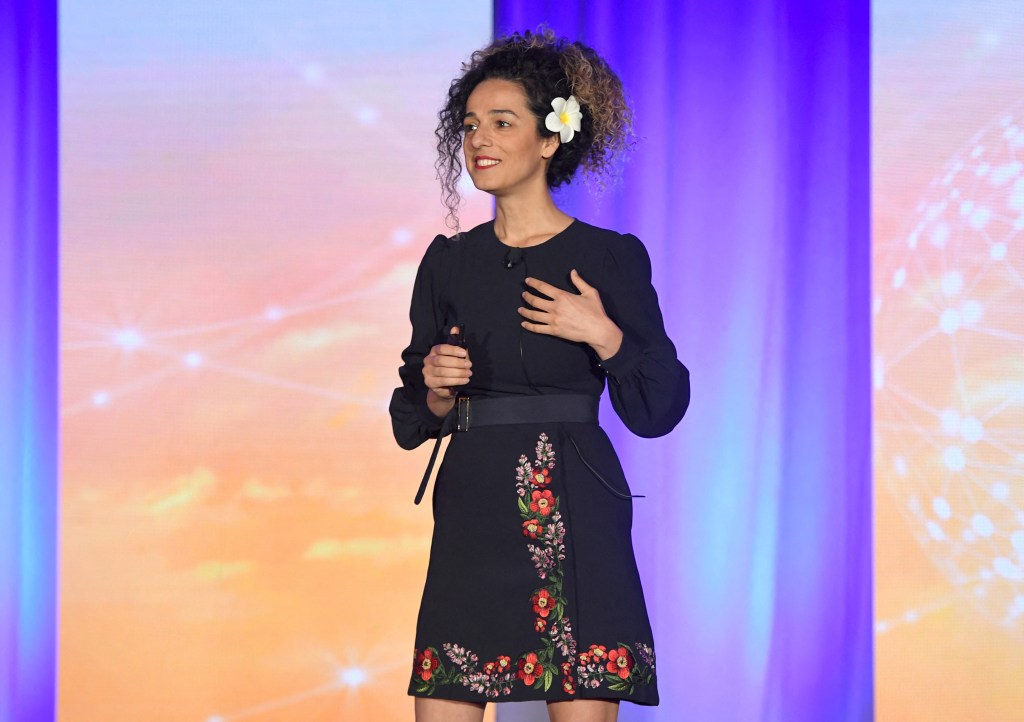After novelist Salman Rushdie, the target of an Iranian fatwa, was stabbed in western New York last week, Iranian American journalist Masih Alinejad said she saw messages on social media saying she should be punished next.
Alinejad, who has extensively covered human rights in Iran and campaigns against the country’s compulsory hijab rule, is no stranger to threats. In July, a man was arrested outside Alinejad’s Brooklyn home with a loaded AK-47. Last year, she was the target of an Iranian intelligence kidnapping plot that was foiled by the FBI. Every day, Alinejad wakes up to simmering vitriol online.
The threats haven’t stopped Alinejad’s work as a reporter and producer at Voice of America’s Persian-language service nor her administration of a popular Facebook page about Iranian women who refuse to wear hijab. She told CPJ that her journalism and activism reinforce one another as acts of defiance against the Iranian government.
CPJ spoke with Alinejad on the phone about her response to Rushdie’s stabbing, which the Iranian government has denied involvement in, and the threats against her and other Iranian journalists in exile. This interview has been edited for length and clarity.
CPJ emailed the Iranian Foreign Ministry for comment on Alinejad’s case but did not receive a response.
How do these routine, real-life threats – some literally at your doorstep — impact your ability to work as a journalist?
Masih Alinejad: It’s not easy; I have to live in hiding. [Following the most recent threat] the FBI moved me to three different safe houses, and each time my life turns upside down. And it’s not just me: My family is at risk as well, just because I am trying to give voice to voiceless people.
I should say that I receive a lot of support from my neighbors and fellow activists, which is appreciated. But it’s not a good feeling that you have to always watch your back.
An assassination attempt is meant to create fear, and they [the Iranian government] were quite successful in doing that. Some organizations who invited me to give a talk were worried about the safety of the people who were going to attend the event. One organization canceled. Another asked me if I have a bodyguard or someone who can offer assurance that they will provide for the safety and security of the event’s attendees. The same with a recent interview: a studio was booked for me, but I was told that there was concern for the safety of the people with whom I would working to film my interview.
What message do you think Iran is trying to send with these threats and attacks against you and others who speak out against the government?
The Iranian regime is not only trying to challenge the U.S. government on U.S. soil, but they’re sending a signal to Iranian journalists in exile. They’re saying that even America cannot be a safe haven for those who fled Iran: they can try to assassinate you or try to take you hostage, even in the U.S., or take your family members hostage inside Iran.
These things have all happened to me: They took my family hostage inside Iran: they brought my sister on TV to denounce me publicly, they put my brother in prison for two years, and now they have come after me.
It’s about the message, not me. They just want to use me as an example to create fear among journalists who live in exile, especially those who dare to criticize the Islamic republic.
[Editor’s Note: Alinejad’s brother was sentenced to eight years in prison but she said he was released on parole after two years on the condition that he no longer speak to Alinejad.]
Iranian women journalists tend to experience high volumes of online harassment, and Iranian dissidents are often targeted by bots. Can you talk more about your experience with online harassment?
I don’t really care about online harassment from unknown accounts or a cyber army attacking me. I can ignore them.
What bothers me is when accounts that have blue checks [are verified] on Twitter threaten me with death. This is real online harassment that the tech companies should feel responsible for. When a verified account, with thousands of followers puts the address of my home online, calls on the Iranian regime to kidnap me and to kill me… that’s a problem.
When the recent Iranian pro-regime activists and journalists celebrated the attack on Salman Rushdie, they said that I should be next. And yet, those accounts are still on Twitter and Instagram. They are the real threats.
All of the journalists know that this is not easy to handle. Every day I wake up and am bombarded with online harassment. They are trying to mentally make me feel unsafe; emotionally trying to isolate me; and physically trying to eliminate me.
Did the Rushdie stabbing change your calculation in terms of how you protect yourself?
It didn’t prompt me to change anything; it made me more determined. I know that if I self-censor the terrorists will win. Assassination attempts are made to compel people to self-censor.
I sometimes don’t know if talking about the fear that the regime creates will empower the regime to put even more pressure on me, or if it is more beneficial to be as vocal as possible.
What I do know is that I’m not going to give up my job, my work, and my fight against tyranny. I have only one life and my life is no different from women inside Iran who get beaten up just for expressing themselves. I dedicated my life to give voice to voiceless people. Salman Rushdie lived in hiding for a decade — I don’t want to have the same fate.
If we don’t get united to end terrorism, they will end us.
